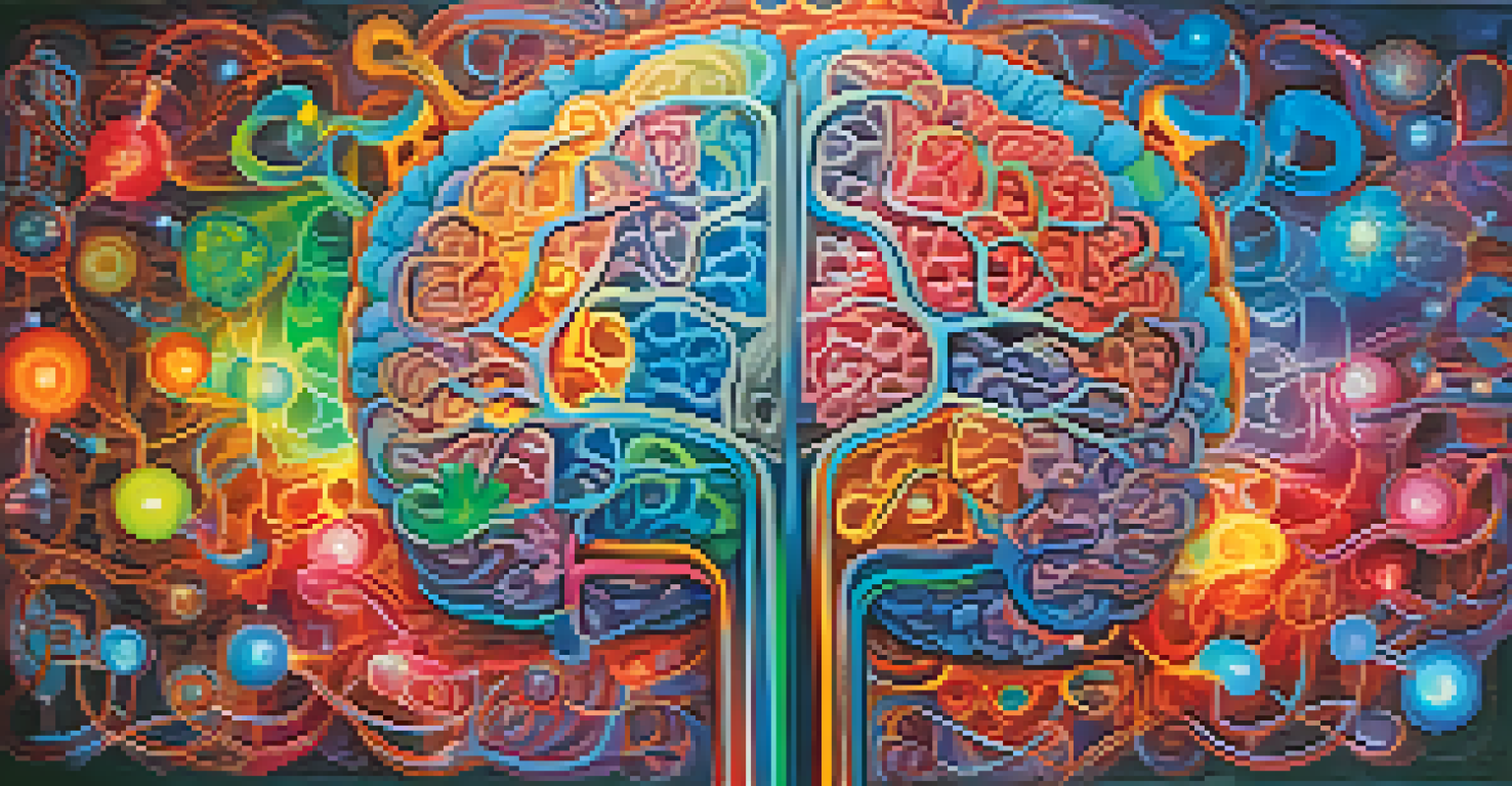Hallucinogens and Their Effects on Compassionate Understanding

What Are Hallucinogens and Their Common Types?
Hallucinogens are substances that alter perception, mood, and cognitive processes. Common types include LSD, psilocybin (found in magic mushrooms), and mescaline. Each of these substances interacts with brain receptors, particularly serotonin, leading to profound changes in sensory experiences and thought patterns.
The experience of connection and empathy is often described as the most profound aspect of using hallucinogens.
For instance, LSD can create vivid visual distortions, while psilocybin often induces feelings of interconnectedness. These experiences can lead individuals to explore deeper emotional realms, prompting introspection and self-reflection. Understanding these substances is crucial to grasping their effects on compassionate understanding.
While the experience can be exhilarating, it’s essential to approach hallucinogens with caution and respect. They are not for everyone, and their effects can vary widely depending on the individual and the environment. This variability is a key factor in how they might influence empathy and compassion.
The Science Behind Hallucinogens and Empathy
Research suggests that hallucinogens can enhance empathic abilities by altering brain activity. Studies have shown that these substances increase connectivity in brain networks associated with emotions and social cognition. This means that when under the influence, individuals may find it easier to connect emotionally with others.

For example, a study involving psilocybin users found that participants reported heightened feelings of empathy and compassion after their experiences. This shift in perception can lead to a greater understanding of others' emotions, potentially fostering more compassionate interactions in everyday life.
Hallucinogens Alter Perception
Hallucinogens like LSD and psilocybin significantly change sensory experiences and thought patterns by interacting with brain receptors.
These findings open the door to exploring how hallucinogens could be utilized in therapeutic settings. By enhancing empathy, they may help individuals work through personal and relational challenges, ultimately leading to more meaningful connections with others.
Personal Stories: Transformative Experiences with Hallucinogens
Many individuals who have experimented with hallucinogens share transformative stories about their experiences. For instance, one person recounted feeling an overwhelming sense of love and connection to others while on psilocybin. This experience not only changed their perspective on life but also helped them mend relationships they had previously struggled with.
Psychedelics can help to dissolve the barriers between self and other, facilitating a deep sense of empathy.
These anecdotes highlight how hallucinogens can promote a deeper understanding of shared human experiences. Participants often report feeling a sense of unity with those around them, which can lead to increased compassion and a desire to help others.
Such stories serve as powerful reminders of the potential for growth and healing that can arise from these substances. While these personal experiences can vary, they illustrate a common thread: hallucinogens can facilitate profound emotional shifts that enhance compassionate understanding.
Risks and Considerations in Using Hallucinogens
While hallucinogens can foster empathy, it’s important to acknowledge the risks involved in their use. Not everyone responds positively, and for some, these substances can trigger anxiety or paranoia. Understanding one’s mental health background and current emotional state is crucial before considering their use.
Additionally, the setting in which hallucinogens are consumed significantly impacts the experience. A supportive, safe environment can lead to positive outcomes, while a chaotic or uncomfortable setting may result in negative experiences. This highlights the importance of preparation and intention for those exploring these substances.
Empathy Enhancement Through Use
Research indicates that hallucinogens can enhance empathic abilities, fostering emotional connections and compassionate interactions.
Ultimately, recognizing both the benefits and risks is essential for anyone considering hallucinogens as a means to enhance compassionate understanding. Responsible use, alongside informed guidance, can help mitigate potential downsides while maximizing positive insights.
Therapeutic Uses of Hallucinogens for Compassion
Hallucinogens are gaining attention in the therapeutic community for their potential to enhance compassion and empathy. Therapists are exploring their use as adjuncts to traditional therapies, particularly for conditions like PTSD and depression. The insights gained during hallucinogenic experiences can help patients confront and process deep-seated emotions.
For example, some studies have shown that individuals undergoing therapy with psilocybin report increased feelings of connection to others and heightened emotional awareness. This can lead to breakthroughs in therapy, allowing patients to develop healthier relationships and a more compassionate outlook on life.
As research continues to evolve, the therapeutic applications of hallucinogens could reshape mental health treatment. By fostering compassion and understanding, these substances may provide valuable tools for healing and personal growth.
Cultural Perspectives on Hallucinogens and Compassion
Historically, many cultures have utilized hallucinogens in spiritual and healing practices. Indigenous tribes often view these substances as sacred tools that facilitate communication with the divine and foster a sense of community. This cultural lens emphasizes the importance of compassion and understanding in the use of hallucinogens.
For instance, in many shamanic traditions, hallucinogens are employed during rituals to promote healing and social bonding. Participants frequently report transformative experiences that enhance their empathy and connection to others, reinforcing communal ties.
Therapeutic Potential and Risks
While hallucinogens show promise in therapeutic settings, it’s crucial to recognize the risks and the importance of a supportive environment.
Recognizing these cultural practices can enrich our understanding of hallucinogens and their potential effects on compassion. By appreciating the historical context, we can approach modern uses with greater respect and awareness.
Future Research Directions on Hallucinogens and Empathy
As interest in hallucinogens grows, so does the need for further research into their effects on empathy and compassion. Future studies could explore specific mechanisms by which these substances enhance emotional connections and social understanding. Understanding the neurobiological underpinnings could provide valuable insights into how they can be safely integrated into therapeutic settings.
Moreover, exploring the long-term effects of hallucinogen use on empathy will be crucial. Do these enhanced feelings of compassion persist after the experience, and if so, how can they be nurtured in everyday life? Answering these questions could significantly influence how we approach emotional well-being.

As we delve deeper into this fascinating intersection of hallucinogens and compassionate understanding, we may uncover new pathways for healing and personal development. This research could reshape our understanding of empathy and its role in human connection.